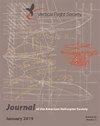Fabrication, Testing, and 3D Comprehensive Analysis of Swept-Tip Tiltrotor Blades
IF 1.4
4区 工程技术
Q2 ENGINEERING, AEROSPACE
引用次数: 2
Abstract
This paper covers the design, fabrication, testing, and modeling of a family of Froude-scale tiltrotor blades. They are designed with the objective of gaining a fundamental understanding of the impact of a swept tip on tiltrotor whirl flutter. The goal of this paper is to describe the development of the blades needed for this purpose. The rotor is three bladed with a diameter of 4.75 ft. The blades have a VR-7 profile, chord of 3.15 inches, and linear twist of –37° per span. The swept-tip blades have a sweep of 20° starting at 80% R . The blade properties are loosely based on the XV-15 design. A CATIA and Cubit-based high-fidelity three-dimensional (3D) finite element model is developed. It accurately represents the fabricated blade and is analyzed with X3D. Experiments in a vacuum chamber were carried out to demonstrate the structural integrity of the blades. Measured frequencies and strains were validated with X3D predictions proving the fidelity of the 3D model. Thus, even though the wind tunnel facilities were closed due to COVID-19, hover and forward flight calculations for the blade stress could be performed using the high-fidelity 3D structural model. The results prove the blades have sufficient structural integrity and stress margins to allow for wind tunnel testing.后倾旋翼机叶片的制造、测试和三维综合分析
本文介绍了一系列弗劳德级倾转旋翼叶片的设计、制造、测试和建模。他们的目的是获得一个基本的了解的影响,掠尖倾转旋翼的旋翼颤振。本文的目标是描述为此目的所需的叶片的发展。转子是三个叶片的直径为4.75英尺。叶片有一个VR-7的轮廓,弦3.15英寸,和线性扭转-37°每跨度。后掠尖端的叶片在80% R时具有20°的后掠。叶片性能大致基于XV-15的设计。建立了基于CATIA和cubit的高保真三维(3D)有限元模型。该模型准确地反映了叶片的加工过程,并用X3D进行了分析。在真空室中进行了实验,以证明叶片的结构完整性。通过X3D预测验证了测量的频率和应变,证明了3D模型的保真度。因此,即使风洞设施因COVID-19而关闭,悬停和前飞叶片应力计算也可以使用高保真3D结构模型进行。结果证明,叶片具有足够的结构完整性和应力裕度,可以进行风洞试验。
本文章由计算机程序翻译,如有差异,请以英文原文为准。
求助全文
约1分钟内获得全文
求助全文
来源期刊

Journal of the American Helicopter Society
工程技术-工程:宇航
CiteScore
4.10
自引率
33.30%
发文量
36
审稿时长
>12 weeks
期刊介绍:
The Journal of the American Helicopter Society is a peer-reviewed technical journal published quarterly (January, April, July and October) by AHS — The Vertical Flight Society. It is the world''s only scientific journal dedicated to vertical flight technology and is available in print and online.
The Journal publishes original technical papers dealing with theory and practice of vertical flight. The Journal seeks to foster the exchange of significant new ideas and information about helicopters and V/STOL aircraft. The scope of the Journal covers the full range of research, analysis, design, manufacturing, test, operations, and support. A constantly growing list of specialty areas is included within that scope. These range from the classical specialties like aerodynamic, dynamics and structures to more recent priorities such as acoustics, materials and signature reduction and to operational issues such as design criteria, safety and reliability. (Note: semi- and nontechnical articles of more general interest reporting current events or experiences should be sent to the VFS magazine
 求助内容:
求助内容: 应助结果提醒方式:
应助结果提醒方式:


